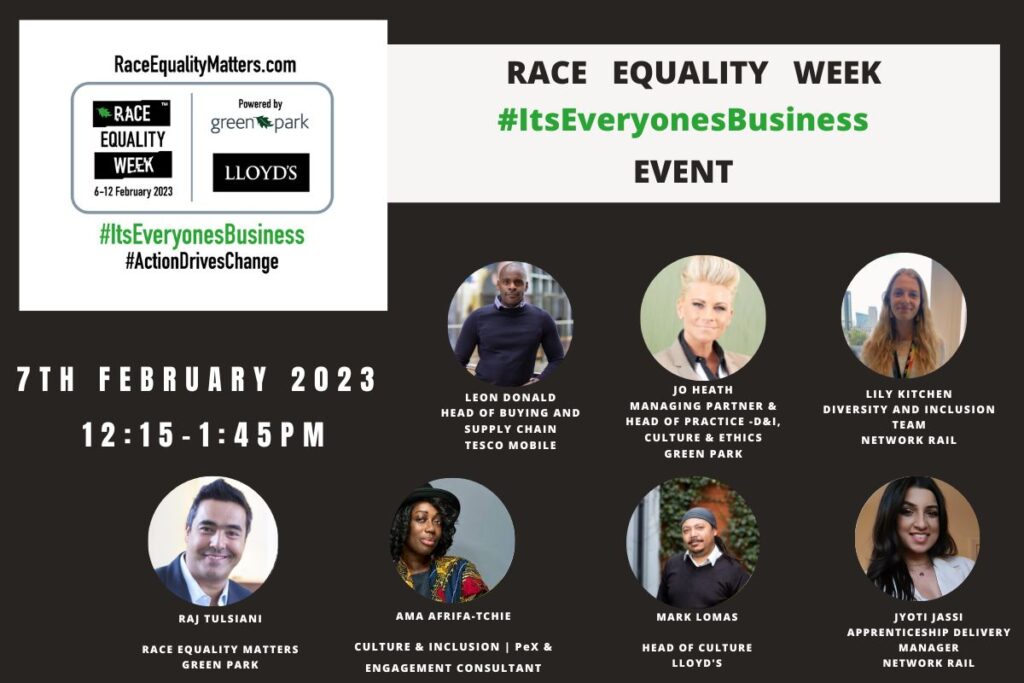As Race Equality Week 2023 has come to a close for another year, Race Equality Matters is committed to sustaining the momentum that was generated. With national and international engagement, this year helped to be the spark to make race equality become everyone’s business.
The second event of the week hosted a series of expert speakers to discuss the impactful work they do. Attendees heard from:
Mark Lomas– Head of Culture at Lloyds
Leon Donald- Head of Buying and Supply Chain at Tesco Mobile
Lily Kitchen– Diversity and Inclusion Team at Network Rail
Jyoti Jassi– Apprenticeship Delivery Manager at Network Rail
With a varied panel of expert speakers, Tuesday’s event also welcomed almost 600 attendees from over 400 organisations.
Though this event sought to highlight theneed for race equality to be everyone’s business, polls conducted found that 70% of attendees believed it is their ethnically diverse colleagues (closely followed by D&I leads) who are playing the key part in tackling race inequality in their organisation, not other groups.
Hence it is the minority who are active and not the majority. This is why change is slow or non-existent in many organisations
Also, under half of attendees considered their organisation to be taking action, not just words, to tackle race inequality too.
An astounding 94% of attendees believe that by making race equality everyone’s business, this will have a positive impact on racial inequality in the workplace and over 80% felt they learnt something useful from the event and our speakers.
It was heartening to know how Race Equality Matters’ focus, on providing the tools and insights to help changemakers and organisations, can create the needed change.
It is clear that employees and employers are not satisfied.
How can your organisation rebalance responsibility on tackling race inequality?
What can your organisation learn from the action of others?
In it for the long haul: the need for a long-term initiative plan
All of the guests were able to demonstrate the impact they had achieved, and all of them emphasised the need for a long-term plan to facilitate this.
Leon told attendees of Tesco Mobile’s Black Action Plan– that he had co-headed- and referred to this as a ‘journey’ to address complex and systemic racism within the organisation. The Plan involved the removal of barriers relating to fair equitable representation at all seniority levels, and an emphasis on talent and community for the organisation’s Black employees.
Within this, was the allyship and role modelling system, as well as reward-driven recognition for behaviour that demonstrated inclusive behaviour and promotion. Reflecting on the ‘reassurance’ this approach gives him, the Plan’s emphasis on allyship was explored:
‘I think it is important to note that allies play a really key role and use their platform to mobilise change for the community. Whether it’s our CEO for the UK… who uses his position to sign off budgets for the Black Action Plan. Allyship does play a key role in how we make race everyone’s business at Tesco.’.
Also referring to Lloyd’s ‘long-term ethnicity plan’, Mark informed attendees of the role allies play in his organisation’s strategy:
‘It’s not enough to have a handful of allies. I think pretty much every organisation can point to a senior leader or the executive that consistently steps forward to do these things. But we need more of a critical mass, and the reality is that ethnically diverse people aren’t represented in enough numbers…. A critical mass of allies is very important.’
Not a tick-box exercise: tailoring initiatives to your organisation
Whilst it is clear that a long-term plan to incorporate everyone in the organisation is necessary, our speakers from Network Rail informed attendees of the need to tailor solutions specifically to the organisation’s needs.
Network Rail’s D&I initiative, Everyone Matters, has a specific element focussed on racial equality. This initiative- in the words of Lily- seeks to make the comp may ‘safer, more diverse and more inclusive’ and kickstarted it through a 40,000 people-wide event that was facilitated by line managers.
Lily referred to the training within this initiative as rejecting the ‘off-the-shelf’ approach as it used real examples of lived experience within Network Rail. With a satisfaction rate of over 90%, it also sought authenticity and redistributive responsibility through relying on line-managers to implement and train:
‘We really focussed on the role everyone had to play on race equality, with examples of front-line managers, senior leaders, colleagues and hiring managers. The onus was really on line-managers stepping up and facilitating these conversations, just as they do about other safety topics in our organisation. The onus wasn’t on HR and it wasn’t on the employee network.’
Jyoti also demonstrated Network Rail’s race network’s – Cultural Fusion- evolving and adaptive strategy, the Allies Programme. Since its creation in Summer 2021, this programme has provided network members and allies with a ‘toolkit’ that is a ‘live document’ that is continually updated with new resources relating to employee demand and interest. The network also offers the Monthly Allies Café that allows for more in-depth conversations beyond the Tea Breaks to help everyone create a more inclusive work environment.
So, when will your organisation create a race equality plan that is both long-term and specifically tailored?
How can your organisation make the initiative everyone’s business, beyond your ethnically diverse community?
Let’s make sure Race Equality Week doesn’t become a distant memory. Let’s make sure the drive against race inequality starts now and more importantly continues.. #ItsEveryonesBusiness
Listen to all our Race Equality Events and access our co-created solution guides today.

